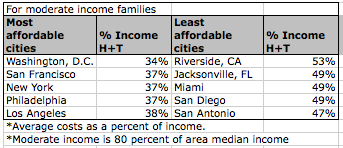
Are Washington, San Francisco, and New York the most affordable American cities? A new report from the New York-based Citizen's Budget Commission [PDF], which made the rounds at the Washington Post and CityLab, argues that if you consider the combined costs of housing and transportation, the answer is yes.
But a closer look at the data casts some doubt on that conclusion. Between the high cost of transportation in sprawling regions and the high demand for housing in compact cities with good transit, very few places in America are looking genuinely affordable these days.
The CBC report uses a better measure of affordability than housing costs alone. Transportation is the second biggest household expense for the average American family, and looking at what people spend on housing plus transportation (H+T) can upend common assumptions about which places are affordable and which are not. Regions with cheap housing but few alternatives to car commuting don't end up scoring so well.
There are some problems with the CBC's methodology, however. While abundant transit is absolutely essential to keeping household transportation costs down, and it provides a lifeline to low-income residents of major coastal cities, the report still tends to exaggerate overall affordability in these areas.
According to the report, for example, New York City ranks third in affordability among 22 large cities. A "typical household" in New York City, the CBC finds, spends 32 percent of its income on housing and transportation combined. Part of the reason New York comes out looking good, though, is that CBC used a regional measure of income but looked at typical rents only in the city itself. Because the region's median income is higher than the median income in the city ($62,063 vs. $51,865, respectively, according to 2008-2012 Census data), NYC appears more affordable than it really is.
Another issue, flagged by Michael Lewyn at his CNU blog, is that by looking at average rents, which in some cities include many rent-stabilized units, the calculation doesn't necessarily capture what someone searching for shelter is likely to pay. If you're trying to find an apartment in New York now, getting a place for the average rent would probably be extremely difficult.
What really stands out in the CBC report isn't that New York, San Francisco, and DC are affordable -- it's that car-dependent areas that may have cheap housing turn out to be so expensive once you factor in transportation.
A commonly accepted definition of "affordability" is when housing and transportation costs consume no more than 45 percent of income. For moderate income families in several cities, including Jacksonville and San Diego, combined H+T costs exceed this threshold. (In these areas, the central city tends to account for a large share of the whole metro region, so the region-vs.-city issue that skews the NYC data is less of a problem.)
While the report didn't include Midwestern cities known for both low housing costs and lower transportation costs, like Minneapolis and Pittsburgh, the overall picture is alarming.
There's no good evidence that in places with good transit, low transportation costs are enough to compensate for the rising cost of housing. Meanwhile, many places that do have cheaper housing saddle low-income people with mandatory car ownership and high transportation costs.





